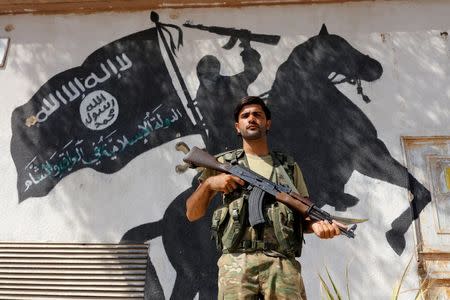Turkey pushes west in offensive against Islamic State in Syria
By Ece Toksabay ANKARA (Reuters) - Turkey renewed air strikes on Islamic State sites in Syria on Friday, extending operations along a 90-km (56-mile) corridor near the Turkish border which Ankara says it is clearing of jihadists and protecting from Kurdish militia expansion. Turkey's 10-day-old offensive, its first major incursion into Syria since the war started five years ago, has alarmed the West. The United States has voiced concerns about Turkish strikes on Kurdish-aligned groups that Washington has backed in its battle against Islamic State. Germany said it did not want to see a lasting Turkish presence in an already tangled conflict. Turkey has said it has no plans to stay in Syria and simply aims to protect its frontier from the militant group and the Kurdish YPG militia, which it sees as an extension of the outlawed Kurdish PKK group fighting an insurgency on Turkish soil. "Nobody can expect us to allow a terror corridor on our southern border," President Tayyip Erdogan told a news conference. Washington says Turkish action aimed at the YPG, part of the U.S.-backed Syrian Democratic Forces (SDF) coalition, risked undermining the broader goal of ridding Syria of Islamic State, which has attacked Western and Turkish targets. Turkish forces and their Syrian rebel allies began the Aug. 24 offensive by seizing Jarablus, a Syrian frontier town, from Islamic State, before turning their sights on what the army said were YPG positions. The YPG denied they were there. In an interview with Reuters on Friday, Deputy Prime Minister Numan Kurtulmus called on the United States to put more pressure on the YPG to return east of the Euphrates river, a move that Turkey hopes would keep the Kurdish militia in check. CLEARING TERRITORY The Turkish military said its warplanes had bombed three sites around the Syrian settlements of Arab Ezza and al-Ghundura, west of Jarablus, roughly in the centre of the 90-km stretch of territory that Turkey says it aims to clear. The government has not said it wants to establish a "buffer zone" but its forces are likely to have to stay in the region for some time to support the Syrian rebels it is backing who number just 1,500. Concerned at the arrival of a new military player in the already complex conflict in Syria, German Foreign Minister Frank-Walter Steinmeier cautioned Turkey against keeping its military there. "We all must have an interest in avoiding long-term military confrontations on Syrian soil," he told reporters in Bratislava. Erdogan said the Turkish operation dubbed "Euphrates Shield" had been successful in clearing Islamic State and Kurdish YPG from a 400-sq-km (150-square mile) area. He denied claims that the YPG, which Ankara calls a terrorist group, had withdrawn to a Kurdish-controlled canton to the east of the Euphrates river, a key Turkish demand. The YPG says it has already removed its forces from the area of the Turkish-backed campaign. U.S. officials have also said it has mostly withdrawn its forces to the east of the Euphrates, a natural boundary cutting through northern Syria. "At the moment, they are saying the YPG has crossed (the Euphrates)," Erdogan said. "We are saying no they didn't. The proof depends on our own observation." His comments were echoed by Kurtulmus, the deputy prime minister, who spoke to Reuters while on a visit to Chicago. He urged the United States to work with its NATO ally Turkey on "all different terrorist threats," a reference to their stark differences in Syria policy. "We would like to see the pressure of the U.S. on the PYD to go to the east of the Euphrates," he said. "So it would be very useful if we would apply this operation with the U.S. forces together." (Additional reporting by Sabine Siebold in Bratislava, Angus McDowall in Beirut and Timothy Mclaughlin in Chicago; Writing by Edmund Blair; Editing by Robin Pomeroy and James Dalgleish)

 Yahoo News
Yahoo News 

